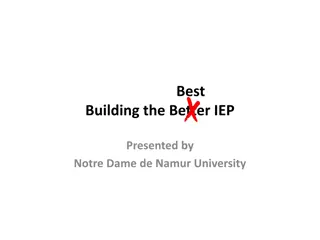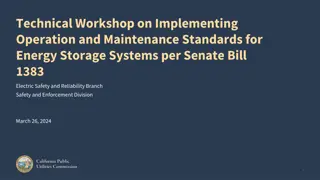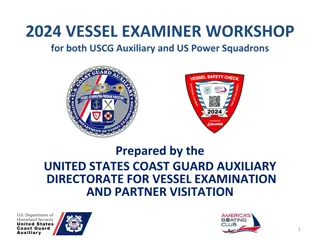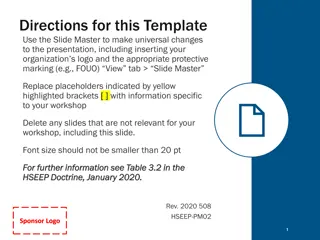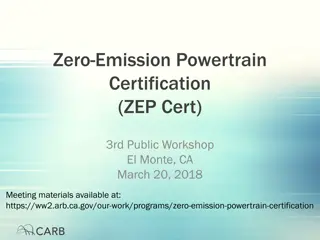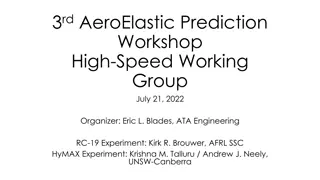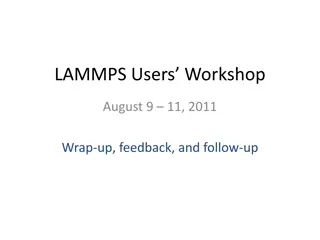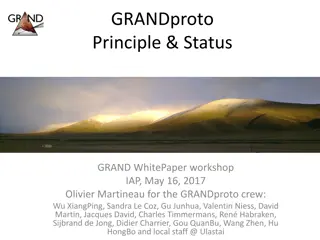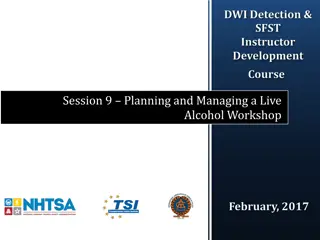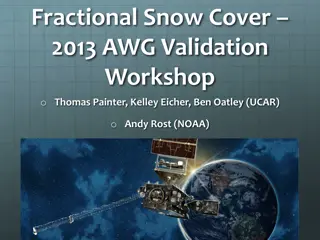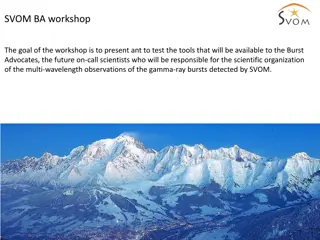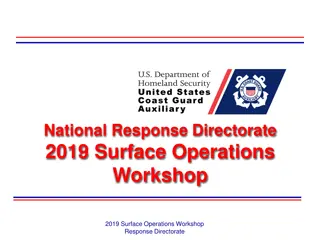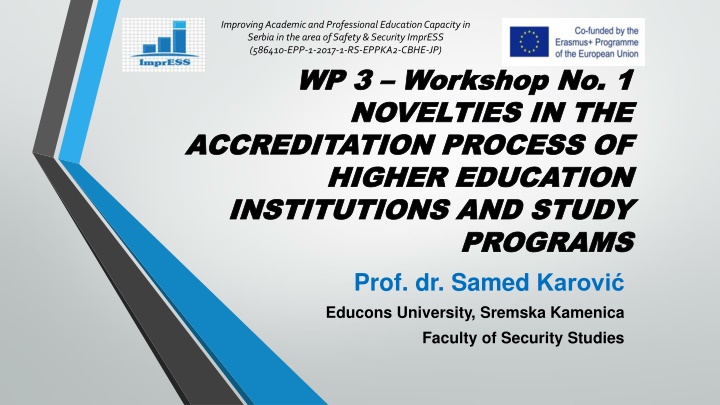
Enhancing Accreditation Process in Higher Education Institutions
Explore the novel methodologies and criteria in the accreditation process of higher education institutions and study programs. Learn about the legal framework, submission deadlines, and evaluation standards for accreditation in Serbia, specifically focusing on safety and security education. Discover the essential standards for accreditation and the requirements for professors in higher education institutions.
Download Presentation

Please find below an Image/Link to download the presentation.
The content on the website is provided AS IS for your information and personal use only. It may not be sold, licensed, or shared on other websites without obtaining consent from the author. If you encounter any issues during the download, it is possible that the publisher has removed the file from their server.
You are allowed to download the files provided on this website for personal or commercial use, subject to the condition that they are used lawfully. All files are the property of their respective owners.
The content on the website is provided AS IS for your information and personal use only. It may not be sold, licensed, or shared on other websites without obtaining consent from the author.
E N D
Presentation Transcript
Improving Academic and Professional Education Capacity in Serbia in the area of Safety & Security ImprESS (586410-EPP-1-2017-1-RS-EPPKA2-CBHE-JP) WP 3 WP 3 Workshop No. 1 Workshop No. 1 NOVELTIES IN THE NOVELTIES IN THE ACCREDITATION PROCESS OF ACCREDITATION PROCESS OF HIGHER EDUCATION HIGHER EDUCATION INSTITUTIONS AND STUDY INSTITUTIONS AND STUDY PROGRAMS PROGRAMS Prof. dr. Samed Karovi Educons University, Sremska Kamenica Faculty of Security Studies
Content Standards for accreditation Documents submission deadlines Reviewers
EXCERPT FROM THE LAW ON HIGHER EDUCATION Accreditation Article 23 (1) Accreditation shall establish that a given higher education institution and its study programmes comply with the standards as set out in Article 12, items 13) and 14) of this Law and that the higher education institution is entitled to issue public documents in accordance with this Law. (2) The accreditation procedure for a higher education institution shall establish whether the institution concerned meets the standards for accreditation, whether it also meets appropriate conditions as provided for in Articles 44 through 48 of this Law and whether it meets the condition in regard to the required number of professors. (3) The higher education institution shall be deemed to meet the requirement regarding the required number of professors if having full-time professors for the performance of at least 70% of hours of active studies at a study programme for which the work permit is sought, and at least 20 full-time professors at the higher education institution.
Six sets of standards Standards for accreditation of higher education institutions, Standards for accreditation of first and second degree study programs, Standards for accreditation of doctoral study programs, Standards for accreditation of doctoral programs in the field of art, Standards for self-evaluation of higher education institutions and Standards for external quality control.
Standards for accreditation of first and second level study programs Standard 1: Structure of the study program Standard 2: Purpose of the study program Standard 3: Objectives of the study program Standard 4: Competencies of graduates Standard 5: Curriculum Standard 6: Quality, modernity and international conformity of the study program Standard 7: Student enrollment Standard 8: Student assessment and progression Standard 9: Teaching stuff Standard 10: Organizational and material resources Standard 11: Quality control
Standards for accreditation of first and second level study programs Additional standards for study programs conducted in a foreign language, for joint study programs, IMT program, distance learning program and for studies in a higher education unit/center without legal personality outside the headquarters of the institution Standard 12. Foreign language studies Standard 13. Joint study program Standard 14. IMT (interdisciplinary, multidisciplinary and transdisciplinary) study program Standard 15. Distance-learning system program Standard 16. Studies in a higher education unit/center without legal personality outside the headquarters of the institution
Curriculum Final paper is required at all stages of study, for all fields and IMT studies. The final paper is presented as a common subject in the study program for all modules. The final paper is presented through two positions/phases: 1. The subject Final paper- (ARW, RW, ASW, SRW) (researches) which is directly related to the completion of the final thesis and is shown as active teaching (ARW, RW, ASW, SRW) 2. Final paper - writing/preparation and defense that is presented as other classes. The research contained in the final paper (active teaching) is: - on Basic applied studies (BAS) - applied-research work - ARW - on Basic academic studies (BAS) research work - RW, - on Specialist applied studies (SAS) applied-research work - ARW - on Master applied studies (MAS) applied and scientific work- ASW, - on Master academic studies ( S) - study research work - SRW, - on Specialist academic studies (SAS) study research work SRW, - on Doctoral studies (DS) - scientific-research work (SRW), i.e. artistic-research work (ARW)
Curriculum The manner and procedure of preparation and defence of the final paper shall be set forth by the general act of the higher education institution.. ARW, RW applied - research is equally distributed to all teachers of the study program, who participate as lecturers in subjects in the category: academic studies - except in the field of art; scientific and / or artistic-professional and professional-applied subjects Applied studies - other than arts; professional and applied subjects Field of Art: Academic Studies - Artistic and Theoretical-Artistic Subjects Applied studies - artistic and professionally applied objects. Final paper it is shown as a common subject in the study program for all modules and enters 25% of the fellowship according to standards. ECTS are included in the total number of ECTS study programs and are counted in the mandatory and elective ECTS positions (mandatory 50%, elective 50% of the total ECTS for final paper).
Teachers References Scientific qualifications are appropriate to the educational and scientific field and the level of their responsibilities, At least 5 references List of teachers ( ) Electronic form!!!
Analysis of the Unified Electronic Form and Introductory Table for the Institution 1. Analysis of the Unified Electronic Form Reviewers should check the following: Is the average teacher workload of maximum 6 classes of weekly active studies, with a tolerance of 20%, (6 + 20%). The total workload of teachers does not exceed 12 classes of active studies per week at all higher education institutions in the Republic of Serbia. Is the average workload of associates 10 active classes per week, with 20% tolerance, (10 + 20%), except in the field of art. Is the individual maximum engagement of associates no more than 16 classes of active teaching per week. Do teachers fully employed (100% ) hold more than 70% of active teaching classes in all programs of this institution, except in the field of art, where the minimum is 50%. Have columns E through J filled in correctly. Whether (Number of groups P; Number of groups V, Number of groups DON) in the sheet (sheet) "Common items" was correctly specified, i.e. whether the columns T, U and V turned red.
Standard 12 for doctoral studies - digital repository The university shall be obliged to establish a digital repository in which electronic forms of the defended doctoral dissertations, i.e. those of the artistic projects shall be permanently kept, along with the report of the commission on the assessment of dissertation, the data on the mentor and the composition of the commission and the data pertaining to the protection of author s rights, as well as to make all specified data publicly available. The institution is obliged to make the information on the mentors, together with the information on their competence and previous mentoring, publicly available on its official website.
Full-time and part-time teachers in the study program Employment status of teachers , . . ( ) Ma , , . 1/5 - - - . .- - . .- .- . . - - - - - : 1. ..... 2. ..... 3. ..... : 1/5 : 1- , 5 - . CTRL +
Full-time and part-time teachers in the study program Employment status of teachers , . . ( ) Ma , , . 1/5 - - - . .- - . .- .- . . - - - - - : 1. ..... 2. ..... 3. ..... : 1/5 : 1- , 5 - . CTRL +
Non-tenured Lecturer (up to a maximum of one third of hours of teaching per course during a semester ) Employment status of teachers Approvals for accreditation from higher education institutions where employment is based should be shown (in accordance with which school year - next school year from the moment of submission of accreditation documentation). Decision on (most recent) election at a higher education institution (HEU) in which the teacher is hired on the basis of a supplementary work contract, if he / she has been selected for teaching profession at HEU due to another narrow scientific field, etc. The consent should include the name of the study programs and subjects for which consent and the accreditation burden are sought, namely: in the institution from which approval is sought, in institutions where consent has already been given and in the institution seeking approval. Supplemental work contract In Table 9.3 indicate the number of teachers in the excerpt from the Electronic Database of the Tax Administration of the Republic of Serbia.
LIST OF DOCUMENTATION REQUIRED FOR ACCREDITATION OF THE STUDY PROGRAM 1. Application for accreditation in electronic and two hard copies: - Arrange the links from the requirements to the general acts. 2. The general files of the institution should contain: - Work permit - Decision on election of Rector-Dean-Director - Act of incorporation - Decision of the Commercial Court for registration in the court register - Statute and act of organization - Accreditation decisions for study programs. 3. Standards for accreditation of study programs (introduction, standards, tables and appendices). - Arrange IT links from standards to tables and appendices in order to function and form a full circle. 4. The documentation for the accreditation of higher education institutions Standard 6. Teaching Staff Table and Annexes and Standard 9: Premises and Equipment, Table and Annexes.
LIST OF DOCUMENTATION REQUIRED FOR ACCREDITATION OF THE STUDY PROGRAM 5. Electronic forms for all study programs and a unified electronic form for higher education institutions 6. In order to prove the legal status and academic qualifications of employed teachers, associates and non-teaching staff, full or part-time, it is necessary to submit in the documentation for accreditation of institutions and study programs: Excerpt from the Electronic Database (ED) of the Tax Administration of the Republic of Serbia or other appropriate document for signed and stamped and placed in electronic form in the appropriate tables. Employment contracts, job titles, diplomas, approvals, declarations, MA and M1 / M2, full- time and part-time staff placed in appropriate attachments. 7. Seven CDs, with documentation for accreditation of the study program and higher education institution Standard 6. Teaching staff: tables and annexes and Standard 9: Space and equipment, tables and annexes. 8. Proof of payment based on the institution's accreditation request.
Modification of ATS documents Septembar 1st, 2019 14:53:53 Changing documentation In accordance with the Plan of Activities aimed at harmonizing the work of the ATS with the requirements of the new edition of ISO / IEC 17011, on July 15th, 2019, a series of documents, primarily related to the assessment of the conformity assessment bodies, intended for use by the ATS were amended ATS assessors / experts. In addition to the aforementioned documents used in the assessment process, ATS-PA01, Accreditation Rules have been amended. The basic changes are as follows: the terminology used is in accordance with the current version of ISO / IEC 17011; the transfer of accreditation is more clearly defined (t.3.8 of the Rules); in the part related to the accreditation process, the part related to the procedure for reviewing the application (t.4.2.2 of the Rules), activities after the preliminary visit (t.4.2.4 of the Rules), the procedure for elimination of non-compliance or concern (t.4.4) .3 Rules) with special reference to the deadline for elimination of non-compliance, additional assessment (t.4.4.3 of the Rules); activities in the accreditation cycle with special reference to regular assessments in the accreditation cycle (t.5.2.1 of the Rules) deadlines for the implementation of the re-evaluation activities (t.6.1 of the Rules); other changes in the scope of accreditation (t.7.3); clarification of the so-called "Dormant activities", as well as how the ATS will react in the event of their being dormant (Rule 11.1). Also, the Accreditation Application and its contents have been modified. The application for accreditation integrated the formerly existing Annexes which existed as separate documents.
Pay special attention to: there is no act of warning; the electronic form is updated annually in December; an essential element is self-evaluation.
REGULATION ON STANDARDS FOR SELF-ASSESSMENT AND QUALITY ASSESSMENT OF HIGHER EDUCATION INSTITUTIONS AND STUDY PROGRAMS The Ordinance sets standards for self-evaluation and quality assessment of higher education institutions and study programs. Standard 1: Quality assurance strategy Standard 2: Quality assurance standards and procedures Standard 3: Quality assurance system Standard 4: Quality of study program Standard 5: Quality of the teaching process Standard 6: Quality of scientific, artistic and professional work Standard 7: Teacher and associate quality Standard 8: Student quality Standard 9: Quality of textbooks, literature, library and information resources Standard 10: Quality of higher education management and quality of non-teaching support Standard 11: Quality of space and equipment Standard 12: Financing Standard 13: The role of students in self-evaluation and quality assessment Standard 14: Systematic monitoring and periodic quality checks Standard 15: Quality of doctoral studies
REGULATION ON STANDARDS FOR SELF-ASSESSMENT AND QUALITY ASSESSMENT OF HIGHER EDUCATION INSTITUTIONS AND STUDY PROGRAMS All higher education institutions in the Republic are subject to the process of self-evaluation and quality assessment of higher education institutions and study programs. The higher education institution carries out the process of self-evaluation and quality assessment: 1. Higher education institutions, their study programs, teaching and working conditions (all 15 standards); 2. Every accredited study program , following the guidelines for self-evaluation of higher education institutions and study programs: Standard 4: Quality of study program, Standard 5: Quality of teaching process, Standard 7: Quality of teachers and associates, Standard 8: Quality of students, Standard 9: Quality of textbooks, literature, library and information technology resources, Standard 10: Quality of higher education institution management and quality of non-teaching support, Standard 11: Quality of facilities and facilities, Standard 13: Student's role in self-evaluation and quality assurance, Standard 14: Systematic monitoring and periodic quality check, Standard 15: Quality of doctoral studies - for doctoral study programs.
REGULATION ON STANDARDS FOR SELF-ASSESSMENT AND QUALITY ASSESSMENT OF HIGHER EDUCATION INSTITUTIONS AND STUDY PROGRAMS 3. Each new study program (following the guidelines for self-evaluation of higher education institution and study programs: Standard 4: Quality of study program, Standard 7: Quality of teachers and associates, Standard 9: Quality of textbooks, literature, library and information resources, Standard 10: Quality of higher education institution management and quality of non-teaching support ( quality of non-teaching support), Standard 11: Quality of space and equipment, Standard 13: The role of students in self-assessment and quality control, Standard 14: Systematic monitoring and periodic quality control, Standard 15: Quality of doctoral studies - for doctoral study programs.
REGULATION ON STANDARDS FOR SELF-ASSESSMENT AND QUALITY ASSESSMENT OF HIGHER EDUCATION INSTITUTIONS AND STUDY PROGRAMS Self-evaluation shall be conducted in the manner and according to the procedure prescribed by the general act of the higher education institution, in accordance with the act on standards for self-evaluation and quality assessment of higher education institutions and study programs. The self-assessment process also considers the assessment of students. The higher education institution conducts the self-evaluation procedure in the fourth year of accreditation of the higher education institution, i.e. study programs, for the period of the previous three years and reports on the procedure and results of self-evaluation, as well as other data relevant for quality assessment, publishes on its website and submits to the National Accreditation Body. The higher education institution shall carry out the following self-evaluation procedure during the preparation of re-accreditation of the higher education institution, i.e. study programs, for the period of the previous three years and report on the procedure and results of self-evaluation, as well as other data relevant for quality assessment, publish on its website and submit to the National Accreditation Agency to the body within the accreditation documentation.
Notice of rules for submission of accreditation documentation Jun 27th , 2019 Higher education institutions are informed that in the process of self-evaluation and accreditation of the institution and study programs, the following rules are applied when submitting documentation: 1. For the SELF-ASSESSMENT REPORT to be submitted: 1.1. Initial document entitled Report on self-evaluation and quality assessment of higher education institution and study programs (three hard copies) 1.2.Three CDs (DVDs) containing: An initial document entitled A Self-Assessment and Quality Assessment Report for Higher Education Institution and Study Programs; Institution self-evaluation report and Self-evaluation report for each individual study program with complete documentation prepared in accordance with the Guidelines. 2. For INITIAL ACCREDITATION to submit: 2.1. Initial accreditation request (three hard copies) 2.2. Three CDs (DVDs) with Request and complete documentation prepared in accordance with the Instructions. 2.3. Proof of payment (Note: Make a request to NAT before issuing an invoice). 3. TO ACCREDITATION OF THE INSTITUTION deliver: 3.1. Request for accreditation of a higher education institution (three hard copies) 3.2. Three CDs (DVDs) with Request and complete documentation prepared in accordance with the Instructions. 3.3. Proof of payment (Note: Make a request to NAT before issuing an invoice). 4. For the STUDY PROGRAM ACCREDITATION submit: 4.1. Application for accreditation of the study program (three hard copies)
Notice of rules for submission of accreditation documentation 4.2.Three CDs (DVDs) with Request and complete documentation prepared in accordance with the Instructions. 4.3. Proof of payment (Note: Make a request to NAT before issuing an invoice). Note: If you apply for accreditation of the institution and study programs at the same time: For the institution, a document entitled: INSTITUTIONS (three hard copies) Application for accreditation of HIGHER EDUCATION For each study program individually, a document is submitted under the title: Application for Accreditation of the given STUDY PROGRAM - SP (three hard copies)
Fees for accreditation and quality control of higher education institutions and study programs 1. The amount of the fee for initial accreditation of a higher education institution and study programs is set at RSD 2,000,000.00; 2. Accreditation fee for higher education institutions is: a. for the university - RSD 1,080,000.00; b. for the Academy of Applied Studies RSD 720.000,00; c. for college and art academy - RSD 540.000,00; d. for high applied studies RSD 480.000,00; e. for academic studies RSD 648.000,00; 3. Accreditation fee for study programs is: a. for the study program- RSD 320.000,00; b. to change the study program RSD 100.000,00; c. for a joint study program - RSD 350.000,00; d. for study program in Serbian and foreign language RSD 350.000,00; e. for each module - 10% of the corresponding study program fee; 4. The amount of the certification and certification fee is: a. for issuing certificates of accreditation of the institution - RSD 48.000,00; b. to issue a program accreditation certificate RSD 20.000,00
Fees for accreditation and quality control of higher education institutions and study programs 5. The amount of the external quality check fee is: a. for the university: RSD 640.000,00; b. for college and art academy RSD 350.000,00; c. for the academy of applied studies - RSD 420.000,00; d. for high applied studies RSD 320.000,00; e. for academic studies RSD 420.000,00; f. for the study program- RSD 180.000,00;
THANK YOU FOR YOUR ATTENTION!

